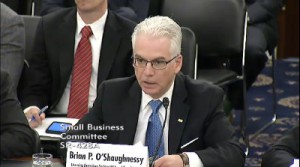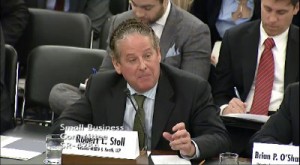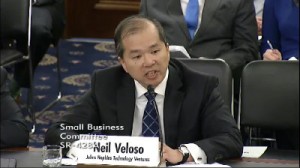On Thursday, February 25th, the U.S. Senate Committee on Small Business & Entrepreneurship held a hearing focused on examining recent changes to the U.S. patent system and their effects on small businesses and patent owners. The morning’s testimony and remarks made during questioning turned the focus of recent patent reform debates towards the need to make targeted reforms instead of overly broad changes to the country’s system of intellectual property protection.
Senate Small Business Committee chairman Senator David Vitter (R-LA) began the hearing by speaking about the importance of a strong patent system to small businesses all over America, as well as the importance of those small businesses to the U.S. economy. Vitter remarked that small businesses have provided two-thirds of all net new jobs since the 1970s and they also produce 16.5 times more patents per employee than larger enterprises. Recent legislation causing major changes in the country’s patent system, including the Leahy-Smith America Invents Act (AIA), have made it more difficult to enforce patent rights. “It’s essential to remember that many legitimate owners of intellectual property do not manufacture anything but nonetheless have legitimate claims of patent infringement against other parties,” Vitter said. He was also wary of the “staggering rate” of decline in patent value during recent years, stating that during the past four years patent values have dropped by as much as 80 percent. Immediately following Vitter was a statement from Senator Jeanne Shaheen (D-NH), the committee’s ranking Democrat, who remarked that patents from small businesses are typically of higher quality and are more than twice as likely to be cited in technical literature.
First to testify was Robert L. Stoll, partner of the intellectual property group at Drinker Biddle & Reath and a nearly 30-year employee of the U.S. Patent and Trademark Office before his retirement in 2011. Without the strong ability to enforce upon patent rights, Stoll said that small businesses are left without the incentive and flexibility to take risks for breakthrough innovations, risks that are typically unacceptable for larger, established entities. “Many large, successful companies throughout history started from meager beginnings,” Stoll said, giving the famous example of Hewlett-Packard getting its start in a garage.
Stoll noted that Supreme Court decisions in Myriad, Mayo and Alice have presented challenges to the lower courts, which have applied those rulings in ways that have limited the availability of patents in core areas of tech such as computer-implemented programs, personalized medicine and diagnostic methods. “These are the very fields in which the U.S. leads the world,” Stoll said. This narrowing of patent-eligible subject matter limits the ability of innovators to provide value to customers, Stoll said, further noting that Europe and China both have broader subject matter eligibility than the U.S.

Brian O’Shaughnessy, Chairman-Elect of the Licensing Executives Society and Shareholder with RatnerPrestia, spoke on behalf of LES.
The U.S. patent system, when it allows innovators to protect their intellectual property, is the “great equalizer” in the words of Brian O’Shaughnessy, chairman-elect of the Licensing Executives Society (LES). “Properly balanced, it enables the nimble innovator, regardless of size or resources, to disrupt and bring forth products,” O’Shaughnessy said. “Those who would deprive inventors of their property right derogate principles on which this country was built.” He noted how patents turn intellectual properties into tradable assets, allowing inventors to specialize in inventing and not have to expend time and energy commercializing a product from their innovations.
O’Shaughnessy also spoke to the economic uncertainty to small businesses posed by changes to the patent system and the global economic downturn, noting that the birth rate of American startups was below the death rate for the first time in 40 years. He called the AIA “well-intentioned but catastrophic” because of new procedures at the USPTO which give an infringer more tools for bleeding a patent owner dry through delays and legal costs. O’Shaughnessy said that a near 20-year low in patent valuation was causing many businesses to turn to trade secrets, which reduces the common store of knowledge in our society and drive innovation underground at a time when the knowledge-based economy is growing. He also testified that proposed legislation S.1137, the PATENT Act, and H.R.9, the Innovation Act, impose burdens on patent owners that do not exist for other property owners. He finished by noting that his company, LES, was working on an initiative to bring together various parties in the intellectual property community to develop standards for ethical behavior in IP transactions. “Industry self-regulation is preferable to the blunt instrument of legislation,” O’Shaughnessy said.
Colleges and universities have had similar concerns as to how proposed patent reform legislation could have negative consequences on their regular research activities. Their voice was represented at this hearing by Neil Veloso, executive director of tech transfer at Johns Hopkins Technology Ventures. “Since Bayh-Dole in 1980, patenting and technology transfer have joined teaching and publication as another means by which knowledge at the university can be brought to the public,” Veloso said. His department at Johns Hopkins has raised more than $250 million in the past five years, which Veloso called a really good response from the market.
“A patent system that’s effective makes our group more efficient,” Veloso said. Universities have to balance their costs and time commitment involved in pursuing patents, which could pull resources away from research activities leading to innovations. Veloso said that targeted legislation would be most effective in combating abusive patent practices while maintaining a college’s ability to fully license its technologies.
The hearing’s questioning period included a basic primer on the history of the U.S. patent system, which was the first of its kind when the founding fathers of America drew up the U.S. Constitution in 1789. O’Shaughnessy spoke to how our country’s system was different than the British in that it was dedicated to the advancement of the useful arts and had a low fee rate structure. “The founding fathers understood it was important for innovation to take hold for America to become a player on the industrial stage,” he said. By contrast, O’Shaughnessy remarked that today’s system does a better job of favoring well-entrenched businesses who already have the market advantage.
Enacting more changes to our country’s system of intellectual property protections is inadvisable given the short amount of time which has elapsed since changes from the AIA have taken effect. O’Shaughnessy said that it could take as many as 10 years for the consequences of that piece of legislation to fully mature. “To further implement a broad approach would be a tremendous mistake,” he said. He later pointed out how the AIA’s attempt to bridge the American “first to invent” system with “first to file” patent systems seen across the rest of the globe is the first such attempt by any nation and it would take time to see all of the resulting effects. Elsewhere, Stoll was critical of the Patent Trial and Appeal Board (PTAB), established by the AIA, which he likened to “a killing field of patents.”
If any legislation on patent reform is to be passed, support from the witness panel and members of the House small business committee was shifted towards S.632, the STRONG Patents Act, sponsored by committee member Sen. Chris Coons (D-DE) along with fellow committee members Vitter and Senator Mazie Hirono (D-HI). Coons took time during his questioning period to speak to how the STRONG Patents Act charts a new legislative course to curb abusive behaviors related to demand letters, also known as patent trolling. Coons said that the STRONG Patents Act would create streamlined pleading requirements and gives the Federal Trade Commission (FTC) considerable powers in taking on abusers of demand letters or post-grant procedural processes. “When a hedge fund can erase millions of investor capital by simply filing a post-grant challenge and short the stock, it’s time for Congress to act,” Coons said, referencing alleged abuses of PTAB’s inter partes review (IPR) and other processes. O’Shaughnessy’s response to Coons covered why he felt the IPR process was counterproductive to small companies which are forced to defend a patent that has already been issued by the USPTO. “For universities and start up companies, they simply don’t have the resources, extensive litigation budgets or personnel to combat the changes of patent reform,” O’Shaughnessy said.

![[IPWatchdog Logo]](https://ipwatchdog.com/wp-content/themes/IPWatchdog%20-%202023/assets/images/temp/logo-small@2x.png)


![[[Advertisement]]](https://ipwatchdog.com/wp-content/uploads/2023/01/2021-Patent-Practice-on-Demand-1.png)

![[Advertisement]](https://ipwatchdog.com/wp-content/uploads/2024/04/UnitedLex-May-2-2024-sidebar-700x500-1.jpg)
![[Advertisement]](https://ipwatchdog.com/wp-content/uploads/2024/04/Artificial-Intelligence-2024-REPLAY-sidebar-700x500-corrected.jpg)
![[Advertisement]](https://ipwatchdog.com/wp-content/uploads/2024/04/Patent-Litigation-Masters-2024-sidebar-700x500-1.jpg)

![[Advertisement]](https://ipwatchdog.com/wp-content/uploads/2021/12/WEBINAR-336-x-280-px.png)
![[Advertisement]](https://ipwatchdog.com/wp-content/uploads/2021/12/2021-Patent-Practice-on-Demand-recorded-Feb-2021-336-x-280.jpg)
![[Advertisement]](https://ipwatchdog.com/wp-content/uploads/2021/12/Ad-4-The-Invent-Patent-System™.png)






Join the Discussion
5 comments so far.
Benny
March 2, 2016 08:22 amKen, it means that you shouldn’t take statistics at face value, but you should think them through. After all, 26% of all statistics just quote figures made up on the spot.
Ken
March 2, 2016 07:45 am“Large enterprises will employ personnel in administration, sales and support who are disconnected from innovation, whereas a small business in a tech field would more likely devote it’s resources entirely to product development and outsource other tasks.”
This means that it’s not apples-to-apples, but it can still be useful information – particularly to the extent that our focus/interest/concern is specifically regarding innovation.
Benny
March 2, 2016 05:30 am“Produce 16.5 times more patents per employee than large
patenting firms.”
That’s a ridiculous statistic. Large enterprises will employ personnel in administration, sales and support who are disconnected from innovation, whereas a small business in a tech field would more likely devote it’s resources entirely to product development and outsource other tasks.
staff
March 1, 2016 03:29 pm‘the need to make targeted reforms instead of overly broad changes to the country’s system of intellectual property protection’
The problem is that with changes over the last 10 years in case law like eBay, Alice, etc and AIA the law now more encourages invention theft than it does protect inventors. Patents have become too hard, too expensive and too slow to get and enforce. The patent system is now a sport of kings where only the wealthy and privileged can survive. Has America become a European style monarchy?
Show us a country with weak property rights and we’ll show you a country with high unemployment and a weak economy. Sound familiar?
For our position and the changes we advocate, or to join our effort, please visit us at https://aminventorsforjustice.wordpress.com/category/our-position/
or, contact us at [email protected]
Ken
March 1, 2016 08:19 am“For universities and start up companies, they simply don’t have the resources, extensive litigation budgets or personnel to combat…”
Thank God that more people are really waking up to the “reverse trolling” epidemic. Saying things like “if your patent is valid, you have nothing to worry about in IPR” makes no more sense than saying “if you’re not infringing, you have nothing to worry about from a suit.” Startups and independent inventors with the most valid patents in the world simply cannot afford to fight a frivolous IPR (and lest people assert that those are rare, remember that it’s just the THREAT which gives infringers so much power).